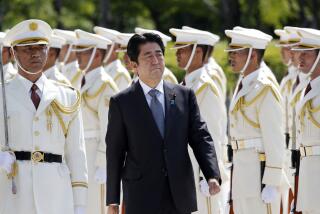Brandt to Be Buried in Berlin Next Week
BERLIN — Willy Brandt, the former West German chancellor who died Thursday after a prolonged struggle against cancer, will be buried next Saturday with full military honors in Berlin, government sources said Friday.
While exact details of the ceremony were still under discussion, officials at the Interior Ministry in Bonn said German President Richard von Weizsaecker will preside over a memorial service at the Reichstag building, the past and future home of the national Parliament. A military ceremony is expected to follow the service, prior to burial.
The plans reflect Brandt’s wish to be buried in Berlin, the German city to which he returned following World War II, after spending the war in exile in Scandinavia. It was here that he launched his political career as mayor in the late 1950s and witnessed the rise and fall of the infamous Berlin Wall.
On Friday, leaders in Germany and throughout the world paid tribute to one of the great statesmen of post-World War II Europe.
French Premier Pierre Beregovoy called Brandt one of a “small number of trailblazers who have led the world toward more freedom and justice.” French President Francois Mitterrand told Von Weizsaecker in a telegram, “You have lost, we have lost, one of our eminent contemporary figures as well as a man of justice and peace.”
British Prime Minister John Major called Brandt a champion of liberty.
“The collapse of communism and the onward march of democracy in Eastern Europe and the former Soviet Union soundly vindicate his bold vision of two decades ago,” the White House said in a statement.
Opening Friday’s session of the German Parliament in Bonn, Bundestag President Rita Suessmuth formally informed the house of Brandt’s passing. “Willy Brandt’s path, more than almost anyone, reflected the turns of history experienced by our people in this century,” she said.
Brandt, who was 78, was an ardent socialist who fled Germany after the Nazis came to power, then returned in 1945 to eventually become chancellor and, more than any other German, help rebuild the nation’s image in the wake of the Holocaust.
Although easily the most popular post-World War II German statesman abroad, he was always controversial at home, with those on the political right considering his famous Ostpolitik treasonable. The policy, which paved the way for West Germany’s resumption of relations with the Soviet Union and its satellites, acknowledged the loss of the former German Reich’s eastern territories.
Chancellor Helmut Kohl also issued an extensive tribute to Brandt, a man who was long his political rival but who had become closer to him in the years since the Berlin Wall fell. Kohl called him a German and European patriot and praised his courage in the fight against Nazi and Communist dictatorships.
While Kohl valued Brandt’s advice and support during the difficult period that has followed German unification, his style of confronting the nation’s troubled Nazi past has proven radically different.
Brandt’s spontaneous kneeling at the Warsaw Ghetto memorial contrasts sharply with Kohl’s conspicuous, consistent absence at public events in the country staged to condemn the recent wave of xenophobic and anti-Semitic attacks in Germany.
More to Read
Sign up for Essential California
The most important California stories and recommendations in your inbox every morning.
You may occasionally receive promotional content from the Los Angeles Times.










